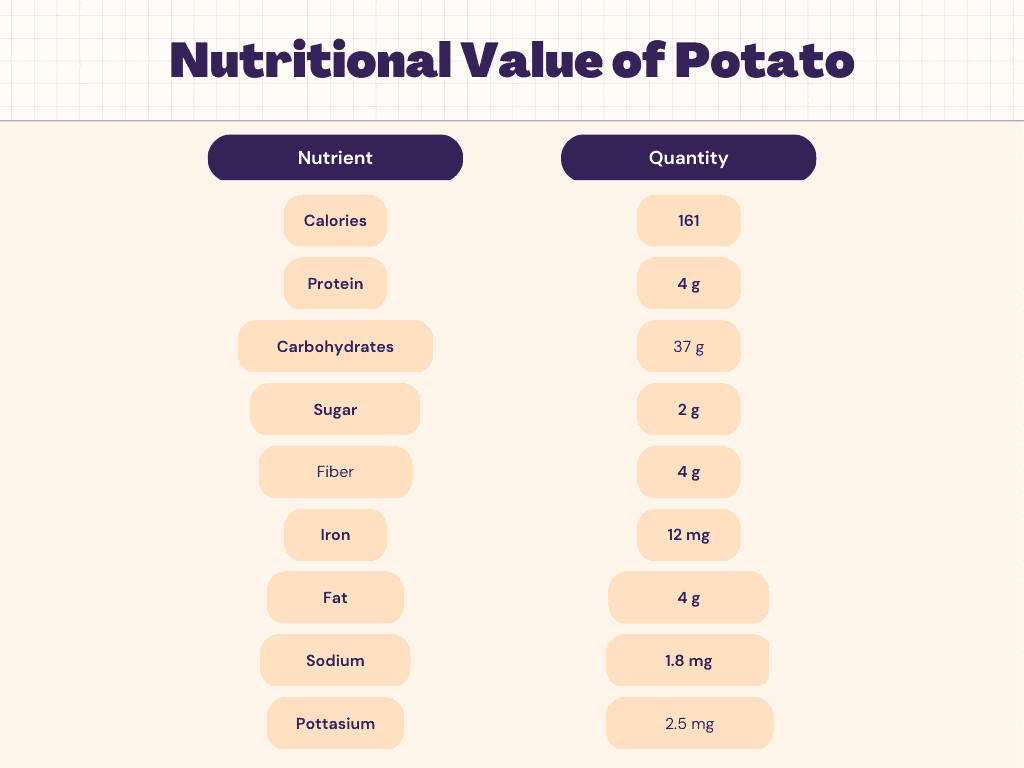We must eat carbohydrates every day because they are important for optimal physical and mental performance. But not all carbohydrates are created equal. While the dictionary doesn’t define “good carbs,” this carb helps our brains and bodies function at their best, curbing cravings and fueling performance, whether we’re working or just getting through the day. Potatoes give you the energy, potassium, and vitamin C you need in your diet. There are several different varieties of potatoes to make meals interesting. Reds, reds, yellows, whites, purples, small and finger colors. Potatoes also come in many different forms depending on your cooking methods: fresh, dried, frozen, and canned. Their versatility means they easily adapt to different personal, cultural, and nutritional diets. They contain a lot of vitamin C, which is an antioxidant. In the early days, potatoes were a source of life-saving nutrition because vitamin C prevented scurvy. Another important nutrient in potatoes is potassium, an electrolyte that helps our heart, muscles, and nervous system.
Nutritional Value of Potato
One unpeeled potato provides more than 0% of the recommended daily amount of vitamin C, about half of the daily requirement of vitamin B6, and more potassium than a banana. Potatoes are also a good source of calcium, magnesium, and folate.
Nutritional Facts of Potato
Carbs
A medium brown potato has 37 grams of carbohydrates, of which only
grams are fiber. Most of the carbohydrates are starch and only a small amount (less than 2 grams) is sugar. During digestion, starch quickly breaks down into sugar in the bloodstream, which leads to a rapid increase in blood sugar.
Fat
Potatoes have only a small amount of fat, and that small amount is divided between saturated and polyunsaturated fats. They also contain small amounts of omega-3 fatty acids and omega-6 fatty acids. As a vegetable, they have no cholesterol. If you don’t add fat or fry the potatoes, they are essentially fat-free.
Protein
There is little protein in potatoes, but the protein is of high quality due to its amino acid composition and digestibility. This means that the protein quality is similar to that of eggs and actually higher than soybeans and other legumes.
Health Benefits Of Potato
- Helps in reducing weight – Potatoes contain Fiber in them, which helps you lose weight by keeping you fuller longer. is found in potatoes. Follow our Diabetes Plan
- Helps with Diabetes – By regulating blood sugar and cholesterol, fiber can help avoid heart disease. Additionally, potatoes are a great source of vitamins that support healthy bodily functioning and antioxidants that fight disease. Follow our Weight Loss Plans
- Helps to deal with chronic care diseases like PCOS – In addition to many other benefits, fiber helps with digestion, blood sugar regulation, weight control, and heart health. Potatoes are a good source of nutritional fiber, especially when the skin is eaten. Check out our PCOS Plans and Thyroid Plans.
Vitamins & Minerals in Potato
Potatoes contain many vitamins and minerals, including vitamin C, vitamin B6, and potassium. They are a good source of folate, niacin, iron, magnesium, phosphorus, copper, and manganese. To get the maximum benefit from potatoes, you need to eat the skin and flesh of the potato, as some micronutrients are more concentrated in the skin.
The Bottom Line
In addition to being a good source of fiber and carbohydrates, potatoes also contribute to satiating and nutritious energy. Potassium, vitamin C, and B vitamins are just a few of the elements found in potatoes.
FAQs
How much Potato is needed in a day?
One can typically eat 0.9 to 2.3 kg of potatoes per day when following the potato diet. According to a study, consuming one medium-sized potato each day, either baked or steamed, is a key component of a balanced diet that lowers the risk of heart disease, stroke, and diabetes.
Should I eat Potatoes before or after exercise?
They are abundant in carbs, which serve as a vital source of energy. Sweet potatoes in particular are my favorite food because they are satiating, sweet, and full of antioxidants. Whichever variety you decide on, I advise eating them either before or after exercise to fuel your body.
What are the benefits of Potatoes?
- Helps in regulating blood pressure
- Helps in supporting the immune system
- Helps in the prevention of chronic diseases
- Helps in weight loss
- Helps in repairing oxidative damage
What is the best time to consume Potatoes?
Consuming potatoes in the morning and veggies in the evening reduces the chance of death from diabetes.










